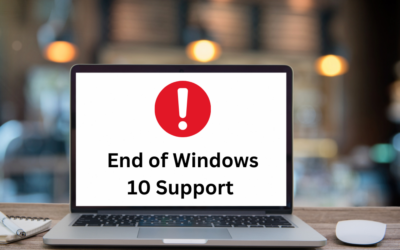The Federal Trade Commission is mandating businesses to implement and maintain a strong cyber security program to protect customer information. All businesses should take these new rules seriously.
Sadly, the majority of small businesses don’t take cyber security seriously enough even though they may believe they are doing enough to prevent a cyber-attack.
Who Does The New FTC Gramm-Leach-Bliley Act Safeguards Rule Apply To?
Back in April of 2022, the FTC issued a new publication entitled “FTC Safeguards Rule: What Your Business Needs to Know.” This was published as a “compliance guide” to ensure that all companies that fall under the Safeguards Rule maintain safeguards to protect the security of customer information.
While you might think your business is “too small” to need to comply, or doesn’t hold any data “that a hacker would want,” you’ll be shocked to discover you are likely wrong.
Hacking groups use automated bots to randomly carry out their attacks – and small businesses are their #1 target due to the gross negligence and inadequate protections they have. You are low-hanging fruit. That’s why the FTC includes more than a short list of obvious organizations, such as CPAs, financial institutions, and credit unions that need to comply. Here’s a list of just a few of the organizations that fall under this new law. This is NOT a complete list:
- Printers that print checks or other financial documents.
- Automotive dealers who provide financing for car purchases.
- Any organization that accepts credit or loans for the goods and services they sell, whether or not the credit is granted.
- Companies that do tax preparation or credit counseling of any kind.
- Real estate settlements, services or appraisals.
- Career counselors that provide services to people employed by or recently displaced from a financial organization.
As you can see, the included companies that must comply is expanding. Bottom line, if you handle any kind of financial data or personally identifiable information, you need to make sure you are complying with these new standards.
What You Need To Do Now
The rule requires you to implement a “reasonable” information security program. But what does that mean? For starters, you need to designate a qualified individual to implement and supervise your IT security program – and you cannot outsource this. Yes, you can and should get a professional IT firm like us to guide you on the implementation, but the buck still stops with you.
The person you designate doesn’t have to have a background in IT or cyber security – but they will be the person responsible for ensuring your company is taking reasonable precautions to comply with the new security standards.
Second, the Safeguards Rule requires you to conduct a risk assessment to initiate an effective security program. From there, you would work with your IT company (us!) to roll out a plan to secure and protect the data you have by putting in place access controls, encryption, data backups, 2FA and a number of other protections.
Cyber security is not something you do once – it’s an ongoing effort of protection as new threats evolve. If you want to see where your organization stands on cyber security, give us a call or click here and fill out the form. That is the first step toward complying and will give you the information you need to know about your own security stance.
Leveraging Cloud Services to Enhance Business Efficiency Along the Jersey Shore
For businesses operating along the Jersey Shore, leveraging cloud services offers a multitude of benefits that can transform operations. Cloud computing provides scalable resources, improved data...
What Happens To Your Applications When Windows 10 Support Ends – And What It Means For Jersey Shore Businesses
Mark your calendars: October 14, 2025 – the day Microsoft officially ends support for Windows 10. After this date, there will be no more security updates, bug fixes or technical support. But for...
Mobile Device Management for Jersey Shore Businesses: Securing Your On-the-Go Operations
For businesses along the Jersey Shore, the ability to operate seamlessly on the go is crucial, especially when quick responses and real-time updates are essential. Mobile Device Management (MDM) is...


